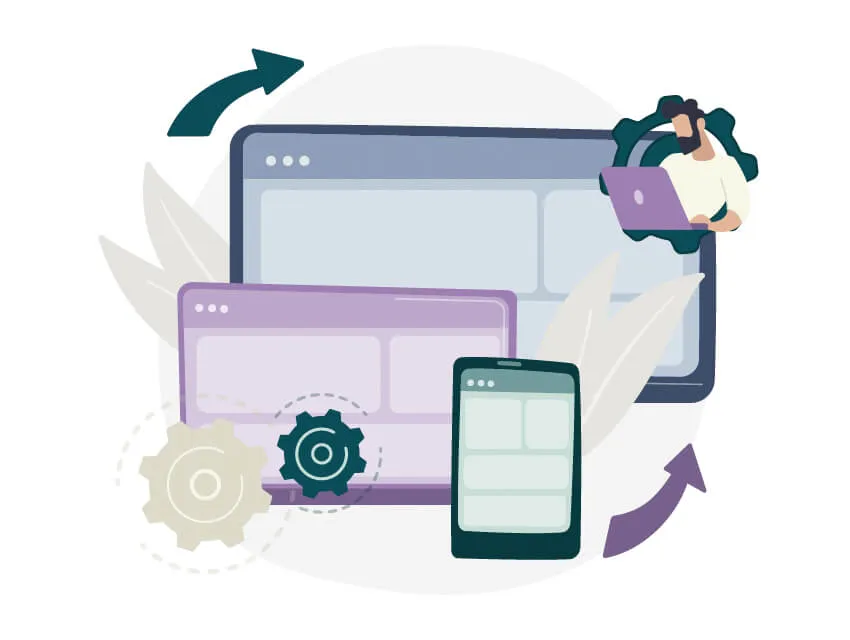
There’s tons of lingo to learn in the SaaS and the business space.
We love our acronyms, don’t we?
Per usual, Woggle Consulting is here to help simplify an otherwise complicated, if not boring, concept. Enter API or Application Programming Interface. You may have seen ‘API’ in your searches for business tools. Today, we’ll unpack what an API is, how they factor into everyday business operations, and how to choose the one that best fits your needs.
Let’s dive in.

The formal definition for an API is:
An application programming interface (API) is a way for two or more computer programs or components to communicate with each other. It is a type of software interface offering a service to other pieces of software. An API specification is a document or standard describing how to build or use such a connection or interface. A computer system that meets this standard is said to implement or expose an API. The term API may refer either to the specification or to the implementation. Whereas a system's user interface dictates how its end-users interact with the system in question, its API dictates how to write code that takes advantage of that system's capabilities.
For the less formal folks in the room, in layman's terms, an API enables different software programs or systems to communicate and interact.
We love a good analogy, so imagine an API as the interface between software systems, just like a waiter facilitates communication between you and the kitchen in a restaurant.

API strategies drive growth and innovation. They’re a pretty big deal for businesses—90% of CEOs say APIs are “mission critical.” Incorporating APIs into business operations can help in various ways, including
In a nutshell, API strategies enable businesses to save time, boost growth, and create new solutions to mundane, inefficient tasks.
Let’s look at some examples of Application Programming Interfaces.
Extra Credit: Check out our blog to learn how to Leverage Your Tech Platforms.
Did you know APIs are everywhere? Here are just a few examples of everyday application programming interfaces you’ll see.
Social Media APIs: Platforms like Facebook, Twitter, and Instagram provide APIs that allow developers to access their data and functionalities. Developers can use these APIs to integrate social media logins, share buttons, or retrieve user data for analytics purposes.
Payment Gateway APIs: Services like PayPal, Stripe, and Square offer APIs that enable businesses to securely accept online payments. Developers can integrate these APIs into e-commerce platforms, websites, or mobile apps to facilitate transactions.
Mapping APIs: APIs like Google Maps, Mapbox, and HERE provide mapping and geolocation functionalities. Developers can use these APIs to embed interactive maps, display directions, or geocode addresses in their applications.
Weather APIs: Services such as OpenWeatherMap and Weatherstack offer APIs that provide weather data and forecasts. Developers can integrate these APIs into their applications to display weather information based on location.
Communication APIs: APIs like Twilio and SendGrid provide communication services such as SMS, voice calls, and email. Developers can use these APIs to send notifications, verify users, or facilitate customer support interactions.
Cloud Storage APIs: Platforms like Amazon S3, Google Cloud Storage, and Dropbox offer APIs that allow developers to interact with cloud storage services programmatically. Developers can upload, download, or manage files stored in the cloud using these APIs.
Financial APIs: Services such as Yahoo Finance and Alpha Vantage offer APIs that provide financial data, including stock quotes, market trends, and economic indicators. Developers can use these APIs to build financial applications or integrate market data into their platforms.
Machine Learning APIs: Platforms like TensorFlow, IBM Watson, and Microsoft Azure offer APIs that provide access to machine learning models and natural language processing capabilities. Developers can use these APIs to add AI-driven features to their applications, such as image recognition or sentiment analysis.

Great question! Application Programming Interfaces vary across industries. Working closely with a consultant will give you clarification on which software services are best for your business infrastructure, goals, and budget.
APIs offer several key advantages for businesses:
Enhanced Efficiency: By leveraging APIs, businesses can automate processes, streamline workflows, and eliminate manual tasks, leading to increased operational efficiency and productivity gains.
Improved Customer Experience: APIs enable businesses to deliver personalized, seamless, and integrated experiences to customers across multiple touchpoints, driving satisfaction, loyalty, and retention.
Innovation and Differentiation: APIs provide a foundation for innovation, allowing businesses to rapidly develop and deploy new features, products, or services and stay ahead of market trends and customer expectations.
Cost Savings: By utilizing APIs to access pre-built functionalities and third-party services, businesses can reduce development costs, time-to-market, and overhead expenses associated with software development.
APIs have numerous real-world applications across various industries:
E-commerce Integration: Businesses can integrate payment gateway APIs to facilitate secure online transactions, shipping APIs for efficient logistics management, and CRM APIs for seamless customer relationship management.
Marketing Automation: APIs enable integration with marketing platforms for automated email campaigns, social media management, and analytics tracking. This helps businesses effectively engage with customers and drive conversions.
Data Integration and Analytics: APIs allow businesses to access and analyze data from multiple sources, such as sales, inventory, and customer databases, to gain valuable insights, make informed decisions, and drive strategic growth initiatives.
Partnership and Collaboration: APIs foster collaboration with third-party vendors, suppliers, and partners, enabling businesses to expand their offerings, enter new markets, and create value-added solutions for customers.

To maximize the benefits of APIs, business owners should consider the following best practices:
Strategic Alignment: Align API initiatives with your business goals, objectives, and customer needs to ensure that API investments deliver tangible value and support long-term growth strategies.
Vendor Evaluation: Conduct thorough research and due diligence when selecting API providers, considering factors such as reliability, scalability, security, and developer support to choose solutions that align with your business requirements and priorities.
Continuous Improvement: Regularly evaluate and optimize API performance, usability, and security based on user feedback, market trends, and technological advancements to maintain competitiveness and relevance in the evolving digital landscape.
Learn more about our custom API Development services.
Whether you're looking to enhance your online presence, optimize internal processes, or explore new revenue streams, APIs offer a versatile and scalable solution for achieving your business objectives and securing a sustainable competitive advantage in the digital age. So, don't overlook APIs' potential—they could be the key to unlocking your business's full potential and driving success in the digital era.
Chat with our team of helpful consultants to find the right APIs for your business.